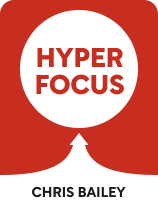

This article is an excerpt from the Shortform book guide to "Hyperfocus" by Chris Bailey. Shortform has the world's best summaries and analyses of books you should be reading.
Like this article? Sign up for a free trial here .
What is hyperfocus? What difference can it make in your life?
Productivity expert Chris Bailey suggests that you can be your most productive self through hyperfocus, that is, focusing on a single task at a time. You become less distractible, and you work more efficiently.
Keep reading to learn about the benefits of hyperfocus.
Hyperfocus: What It Is and Why It Matters
You can work with the biology of your brain to deliberately direct your attention for maximum productivity. Bailey calls this method “hyperfocus.” We’ll define what hyperfocus is and explain why it matters.
| Shortform’s Definition of Hyperfocus Bailey’s description of hyperfocus is contradictory. Initially, he describes hyperfocus as a state in which a single task “fills your attentional space completely.” (”Attentional space” is Bailey’s term for working memory capacity.) But later in the same chapter, he espouses many benefits of hyperfocus that are possible only because you “have some attentional space to spare” during hyperfocus. Bailey doesn’t directly address this apparent contradiction in his definition of “hyperfocus,” but we can infer that in some moments of hyperfocus, a single task fills up all your working memory capacity, while in others, the task takes up most of your working memory capacity but leaves some of it free. For clarity, we’ve defined hyperfocus based on what Bailey states is its “most important aspect”—the fact that you’re focused on a single task. |
What is hyperfocus? It’s when you direct your focus on a single task. By doing so, you accept that your working memory capacity is limited and work within its confines. This allows you to avoid the biological attention traps we’ve discussed and maximize your productivity. By actively directing your focus, you deliberately direct your attention and don’t work in autopilot mode. Focusing on a single task ensures the task fits comfortably within your working memory capacity. As such, you don’t overload your attention. Instead, you experience the benefits of having spare working memory: You are better able to defend against distractions, you refocus your attention faster when your mind wanders, and you make better decisions about your task. In other words, you become less distractible, and you work more efficiently. You also avoid the traps of multitasking: Unlike when you multitask, you use your brain’s hippocampus instead of the basal ganglia, so you remember all the mistakes you made and don’t make them again—which improves your efficiency.
| Why You Should Learn About Single-Tasking All of the benefits Bailey spouts about hyperfocus have been well-documented—notably in Deep Work, which describes extensively the dangers of distractions and multitasking and how single-tasking can make you more efficient. However, most authors discuss the benefits of single-tasking instead of hyperfocus. Indeed, you could reasonably argue that they’re exactly the same thing. So why do we need a whole book about focusing on one task? The obvious response, which Bailey addresses and which the spate of productivity books in recent years suggests, is that we live in a world full of more distractions than ever before, so we need more techniques to avoid those distractions. Another potential response is that teaching people how to focus is especially important for younger generations, who’ve only ever lived in worlds inundated with technology and thus are terrible at focusing. But this may not be true: Younger generations may be both capable of focusing and also better at filtering out non-essential information than their predecessors. |
Hyperfocus also maximizes your productivity because it helps you achieve a “flow state.” First defined by Mihaly Csikszentmihalyi, flow states occur when we’re so occupied by what we’re doing that we forget that time is passing. Flow states occur when a task meets the ideal level of difficulty, pushing your cognitive limits just enough to be challenging but not so much so that it’s distracting. And, as Bailey notes, we’re far more likely to experience flow if we are focused on a single task. (Shortform note: Most of us think about flow states when we’re trying to achieve a task, but Csikszentmihalyi’s Flow also discusses how to achieve flow states in your relationships. In fact, having friendships and romantic relationships with flow is essential to your happiness.)
Bailey argues that hyperfocus is especially beneficial for busy people: The busier you are, the more you need to hyperfocus because it becomes even more critical to prioritize the correct tasks and not waste time on low-impact tasks.
(Shortform note: In The Busy Trap, author Tim Kreider argues that we like being busy because it reassures us that our lives are filled with meaning. In contrast, both Bailey and Essentialism suggest that we can find more meaning by doing fewer activities but doing them better.)
Crucially, despite its intense name and the fact that Bailey mostly describes how to hyperfocus at work, hyperfocus is essential in your personal life, too. You can hyperfocus just as well on a budget report as you can on a trip to the zoo with your kids. (Shortform note: In Deep Work, Newport makes a similar point about deep work, which he defines as any task you do that’s aligned with and focused on your values. You can hyperfocus on spending time with your children, and spending time with your children can count as deep work.)
Bailey highlights how hyperfocusing on conversations improves your relationships, going so far as to posit that “love is nothing more than sharing quality attention with someone.”
(Shortform note: Hyperfocus may help your relationships because we’re just as distracted at home as we are at work. Looking at your phone while you’re with someone has become so prevalent there’s a word for it: phubbing, an amalgamation of phone and snubbing. But phubbing decreases the quality of your relationships—one study found that just having a phone nearby during a conversation reduced the trust and empathy participants felt from and towards one another.)

———End of Preview———
Like what you just read? Read the rest of the world's best book summary and analysis of Chris Bailey's "Hyperfocus" at Shortform .
Here's what you'll find in our full Hyperfocus summary :
- Why it's just as important to learn how to manage your attention, along with your time
- Why you still feel tired no matter how many breaks you take
- Strategies for managing your attention for better productivity and creativity






